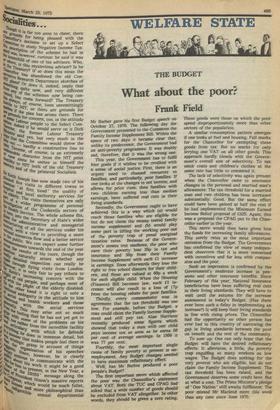THE BUDGET
What about the poor?
Frank Field
Mr Barber gave his first Budget speech on October 27, 1970. The following day the Government presented to the Commons the Family Income Supplement Bill. Within the space of two days it became clear that, unlike its predecessor, the Government had an anti-poverty programme. It was doubly sad, therefore, that it was the wrong one. This year, the Government has to fulfil four goals if it wishes to be credited with a sense of social justice. First, there is an urgent need to channel resources to families, and particularly, poor families. If one looks at the changes in net income, and allows for price rises, then families with two children earning less than median earnings, have suffered real cuts in their living standards. Secondly, the Government ought to have achieved this in a way which (a) would reach those families Who are eligible for but do not claim the means tested family income supplement and (b) would play some part in lifting the working poor out of the poverty trap of penal marginal taxation rates. Because of the Government's means test madness, the poor who earn their poverty lose 35p in tax and insurance and 50p from their Family Income Supplement with each El increase in earnings. Soon afterwards they lose the right to free school dinners for their child ren, and these are valued at 60p a week for each eligible child. When the Housing (Finance) Bill becomes law, each El in crease will also result in a loss of 17p from the housing rebate for poor families. Thirdly, every commentator was in agreement that the tax threshold was too low. For example, before the Budget, a man could claim the Family Income Supplement and still pay tax. Alan Harrison recently produced some figures which showed that today a man with one child pays income tax as soon as he earns 50 per cent of average earnings. In 1950 it was 77 per cent. Fourthly, the most important single cause of family poverty at present is un employment. Any Budget changes needed to have maximum reflationary effect. Well, has Mr Barber produced a poor people's Budget? The first important move which affected the poor was the Chancellor's statement about VAT. Both the TUC and CPAG had asked that a wide nurnber of goods should be excluded from VAT altogether. In other words, they should be given a zero rating. These goods were those on which the poor spend disproportionately more than other sectors of the population.
A similar consumption pattern emerges if one looks at fuel and housing. Full marks for the Chancellor for exempting these goods from tax. But no marks for only levying one VAT on all other goods. This approach hardly blends with the Government's overall aim of selectivity. To tax mink coats and children's clothes at the same rate has little to commend it.
The lack of selectivity was again present when the Chancellor came to announce changes in the personal and married man's allowances. The tax threshold for a married man and two children has been increased substantially. Good. But the same effect could have been gained at half the cost if he had implemented the Minimum Earned Income Relief proposal of £325. Again, this was a proposal the CPAG put to the Chancellor earlier in the year.
This move would then have given him the funds for increasing family allowances. This surely rates as the most important omission from the Budget. The Government has confirmed the view of Many independent observers that it is more concerned with incentives and far less with compassion and the poor.
Such an impression is confirmed by the Government's moderate increase in pensions and other insurance benefits. Since February of this year, National Insurance beneficiaries have been suffering real cuts in their living standards. They will have to wait until the autumn for the increase announced in today's Budget. (Has there ever been such a delay in implementing an increase?) It will keep their living standards in line with rising prices. The Chancellor had the opportunity no other person has ever had in this country of narrowing the gap in living standards between the poor on benefit and the rest of the community.
To sum up. One can only hope that the Budget will have the desired reflationary effects. It alleviates, a little, the poverty trap engulfing so many workers on low wages. The Budget does nothing for the very poorest who are eligible, but do not claim the Family Income Supplement. The tax threshold has been raised, and the Government deserves some credit here. But at what a cost. The Prime Minister's pledge of ' One Nation' still awaits fulfilment. The poor missed Mr Macleod more this week than any time since June 1970.










































 Previous page
Previous page